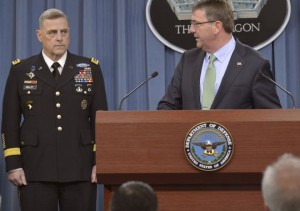
General Mark Milley in middle as confirmation, Bergdahl case loom
The defense team for alleged deserter Sgt. Bowe Bergdahl says an impending Senate committee’s investigation into the case creates a conflict of interest for the officer overseeing it: Gen. Mark Milley, who will sit in front of the same panel as part of the confirmation process to become the Army’s next top officer.
Lawyers for Bergdahl have asked a military appeals court to disqualify Milley, tapped by President Obama last month to be the Army’s next chief of staff, as court-martial convening authority. Military legal minds are split on the validity of the claim, and the head of the committee said the Bergdahl case won’t distract from the confirmation process.
Sen. John McCain, R-Ariz., told Army Times last week that the Senate Armed Services Committee would begin its official examination of the Bergdahl case “as soon as the final decision is rendered” and that Milley’s confirmation won’t be affected. The SASC confirmation hearing would be scheduled “as soon as they send [Milley] over,” McCain said, but didn’t offer a date.
“I was briefed by him in Afghanistan, and I’ve gotten to know him,” McCain said of the nominee, now in charge of Army Forces Command. “I think he’s very well-qualified.”
Lawyers for Bergdahl filed the motion to have Milley disqualified June 5 with the U.S. Court of Appeals for the Armed Forces; the government had until Monday to file a response, Bergdahl’s civilian defense attorney, Eugene Fidell, told Army Times.
Fidell wrote to Milley on May 17, days after his Chief of Staff nomination had been announced, asking the general to recuse himself from the case. Berghdal left his post in Afghanistan and was held by the Taliban for five years. He was exchanged last year for five senior Taliban officials held at Guantanamo Bay, Cuba.
The SASC’s “intense interest in the subject, combined with its jurisdiction over military nominations and your own entirely understandable interest in being confirmed … necessarily calls into question – as a matter of both subject and appearance – your ability to make the requisite decisions about Sergeant Bergdahl’s case on its own merits, as the Uniform Code of Military Justice requires,” Fidell wrote in the letter, which was included in court filings.
Milley, who made the decision in March to charge Bergdahl with desertion and misbehavior before the enemy, stayed on the job. Fidell filed suit.
“This writ appeal will be addressed by the United States Court of Appeals for the Armed Forces as a matter of pending litigation,” an Army spokesman said in a statement. “At this point General Milley only has been nominated for the position of the Chief of Staff of the Army — pending Senate confirmation. So, he currently continues all of his duties and responsibilities as commanding general of U.S. Army Forces Command — including his role as a general courts-martial convening authority.” Forces Command trains and deploys land forces to top combat leadership.
Making the legal case
Three former military lawyers who spoke with Army Times had varied opinions on the merits of the disqualification request, but all had at least some doubts as to its success.
“The suggestion that Gen. Milley is somehow conflicted in this case is speculative, at best,” said Daniel Conway, a former Marine captain who has represented members of all military branches as a civilian defense lawyer. “It’s going to be a tall order for them to be able to do this successfully.”
However, lawyers for Bergdahl do not have to prove Milley intends to carry out his duties as court-martial authority in a way that would increase his confirmation chances at the expense of justice, a former Air Force lawyer said: They must only show that public perception could lead to such a conclusion.
“It’s the appearances,” said Rachel VanLandingham, a retired Air Force lieutenant colonel and former judge advocate who serves as an associate law professor at Southwestern Law School in Los Angeles. “Conflict of interest deals with both appearances and reality.”
Such a high-profile case would be better in the hands of a general who would reach retirement before facing a Senate committee, she said, or one who had just assumed a new position and would not need Senate sign-off, required for all officer promotions, for several years.
The appeals court, VanLandingham said, may choose not to weigh in on the issue. Victor Hansen, an associate dean and law professor at New England Law in Boston, also said he’d be “surprised” if the request were granted, and “would similarly be surprised if it had any real legs at trial, or on appeal.”
Part of the problem, Hansen said, is that the Senate’s opinion regarding Bergdahl is “not nearly as directed, not nearly as pointed” as other instances where politicians’ remarks have influenced judicial proceedings. He cited a 2013 ruling from a Navy judge in two sex-assault cases claiming remarks by President Obama that offenders should be “court-martialed, fired, dishonorably discharged, period” constituted undue command influence and would limit punishment options for the defendants.





Leave a Reply